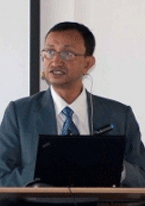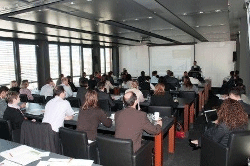Released: Apr 7, 2011
7 April 2011 in Munich - Review
As the exclusive German partner of the international ‘IRIS’ market research network, Vocatus organised an Asia Forum on 7 April 2011 entitled ‘Market Research in Asia: What Really Matters’. This event allowed market researchers from a variety of different companies to get first-hand information about the situation in various Asian countries, and to make direct personal contact with the leading lights of Asian market research. In order to achieve this, IRIS members from Japan, China, India, Pakistan, Malaysia and Australia came to Germany and reported on the special features, challenges and stumbling blocks facing market research in their respective countries. The fact that this concept met with considerable interest in Germany was already demonstrated when the event was fully booked after just a few days. Participants represented a broad cross-section of B2B and B2C companies that are interested in the Asian market.
The lectures from the various contributors above all emphasised the differences between these countries, and of course the ways in which they are unlike Europe. India has 22 regional languages, which means there also have to be 22 different call centres so that projects can be represented in the respective language. It was particularly interesting when contributors talked about stumbling blocks when actually carrying out projects. In-person interviews in India must always be conducted by somebody who belongs to the same social class, or caste, as the interviewee; anyone else would be rejected. Thus, for example, the cost of employing interviewers varies in accordance with the target group of respondents; depending on their social class, one interviewer can charge ten times more than another.

In terms of the social environment, it is also important in India to remain within the respective ‘boundaries’. Housewives from the poorer middle class cannot simply be asked to attend an interview in a hotel or focus group room. Firstly they would never countenance entering this space, and secondly they would definitely refuse to reveal anything about themselves in a place like this. If one wishes to conduct a focus group with housewives one must therefore find a private house which has a room big enough to accommodate them. At the same time, the building’s furnishings and décor must approximately reflect the respondents’ social class, or be slightly superior to it. The choice of words in the questionnaire (and above all its complexity) must be adapted to the respective target group, otherwise it simply won’t be understood.
By contrast, in China it’s not so much the social class that’s the problem, but rather the issue of how to actually make contact. Life in China is characterised by a densely woven and complex network of social relationships; generally speaking, making contact with a stranger and asking them to participate in a survey is neither customary nor likely to be successful. One therefore has to find ‘intermediaries’ to make contact, people who are known to both the market researcher and the respondent, and they can then initiate the contact.
The methodology that’s chosen must also match the content of the survey. In Chinese culture, important issues are always discussed face-to-face. A telephone or online survey is thus out of the question for many types of content because it simply runs counter to this culture.
For example, representative national surveys are generally not conducted in China because the companies commissioning them are usually only interested in towns/cities where citizens have a high disposable income. However, one must also be careful to make distinctions here, for example in relation to the size of cities. In up-and-coming cities, buying a new (prestigious) car is often still so unusual that the happy new car purchaser would like the handover to be celebrated with a major ceremony and a great deal of razzamatazz. Above all, it’s important that this handover should be loud, so that everyone gets to know about it. By contrast, in more established cities people are likelier to rely on a somewhat quieter ceremony where the new car is handed over to the vigorous applause of the dealer’s employees.
Particularly in China, any project that’s planned should be discussed as soon as possible with the local institute since the political situation means there are some restrictions in terms of topic areas and questions that one can actually ask. It’s also problematic in China that there is practically no information about the size of a certain market or what the competition is like. This is mainly down to the fact that there are no real industry associations, so data that in Germany can simply be looked up on the internet or gathered via detailed desk research often has to be collected in China via an elaborate and time-consuming process.

In Japan only an infinitesimal amount of all market research (3%) is carried out using phone interviews (the figure in Germany is just under 40%). This is mainly down to the fact that the rate of participation on the phone is very low. By contrast, if people are spoken to in person they are unlikely to say “no” simply because the Japanese are very polite.
Surveys that are representative of the overall population are both popular and taken for granted in Germany. However, simply trying to draw a representative sample of the population can require complex statistical procedures in India. The main reason for this is that the population is increasing rapidly and moving so quickly from the countryside to towns and cities that one cannot rely on official figures because they are usually hopelessly out of date. A regular census is conducted in Germany, and this at least reveals the size of the population and some basic demographic patterns. The last census in Germany prior to the one this year (2011) may have been in 1987, i.e. 24 years ago, but one can generally make good use of the data that’s available because the changes are relatively minor. In the same period, the population in India has grown from 800 million to 1.2 billion, and there is a constant drift from the countryside to cities which makes it much harder to carry out a representative survey.

Germans often perceive that Asian people are uncommunicative and don’t show their feelings, thus making them hard to reach in focus groups and 1-1 explorations, but this prejudice was challenged in the lectures. Although it is definitely an issue in Japan, which has a very hierarchical society, one can for example count on very frank responses and extremely emotional discussions in other countries.
The event also demonstrated the importance of personal contacts with local market researchers. Participants thus had the opportunity during breaks and the joint midday meal to discuss individual and company-specific issues with the IRIS partners from the various countries.
All the lectures delivered at the Vocatus Asia Forum were recorded on video and can be viewed by clicking the links at the top of this page.

We are pleased to welcome moweb research to our Global Network.
Based in Düsseldorf, Germany, moweb is led by Herbert Höckel. It is a leading digital market research agency founded in 2004, and specializes in delivering data-driven insights through its proprietary online panel, offering global reach and robust sampling solutions for B2C and B2B studies alike.
With expertise across sectors including FMCG, technology, automotive, finance and the public sector, moweb provides custom quantitative research solutions using online, mobile and hybrid methodologies. As an independent and trusted research agency, moweb maintains the highest quality and data protection standards in every project.
Moweb is also a pioneer in integrating behavioral science and psychological models into survey design - ensuring results go beyond numbers to uncover real motivations, attitudes and decision-making patterns.
Together with AMR Advanced Market Research —moweb's sister company focused on CATI-based B2B research in over 70 countries— the group offers fully integrated, cross-methodological research capabilities tailored to complex, international briefs. With an exceptionally high rate of returning clients, moweb stands for reliable delivery, deep sector knowledge and innovation. As an active ADM; BVM, DGOF and ESOMAR, moweb is also a strong advocate for collaboration, global standards and the future of the research profession.
We are confident that Moweb's expertise will strengthen our international network of market research agencies.

IRIS is pleased to welcome Amárach Research to our Global Network.
Based in Dublin, Ireland, Amárach is led by Gerard O’Neill. Amárach is one of Ireland’s best known market research agencies, quoted regularly in the media for our research on behalf of clients and other agencies. They help their clients to succeed and grow through a better understanding of their customers’ needs.
Amárach work with a range of public and private sector clients, across a mix of quantitative and qualitative research requirements, from national surveys to focus groups to in-depth interviews. With their research partners, Amárach has developed powerful, AI-based solutions to drive deeper insights from existing studies as well as developing new methodologies using social media and related channels to inform strategy.
Amárach work collaboratively with all their clients —whether directly with companies and organizations, or in partnership with other agencies (advertising, PR, etc.)— focusing on a successful outcome for their clients.
Over 85% of Amárach’s clients return each year for follow up studies, tracking research and new, innovative solutions to their insight and research needs. Amárach is comprised by 20 experienced analysts and executives that enable a wide range of requirements from both large and small clients.